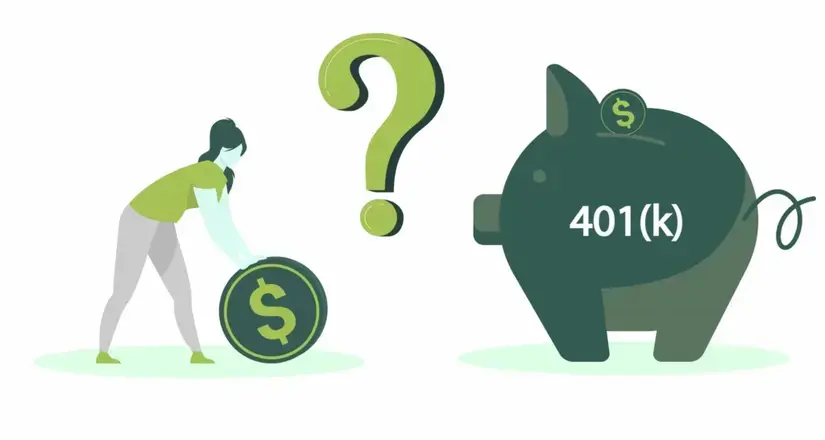401K for Expats: A Guide
If you are looking to invest as an expat or high-net-worth individual, which is what I specialize in, you can email me (advice@adamfayed.com) or use WhatsApp (+44-7393-450-837).
Whilst we have done our best to make sure this piece is accurate at the time of publication, nothing written here is formal advice, and the facts might have changed since we first penned the article.
Introduction
We’ll discuss 401k for expats in this guide.
It’s an exciting period in your life when you decide to move abroad to live and work. It’s crucial to plan and get ready for your vacation in order to make it easy and effective from a financial and personal perspective. How you will manage your funds is a crucial factor to take into account.
How to manage the 401k is one of the top concerns among US expats when it comes to money. 401ks are among the most widely used savings accounts in the US. Employee 401k plans are widely offered by US employers. What you need to know about 401ks while living abroad is provided here.
The Basics of 401K for Expats
Before we discuss how to manage your 401k for expats if you are an American expat living abroad, let’s quickly review how 401ks operate.
With a 401k for expats, an employee can deduct a set amount from their pay and deposit it straight into their retirement account. The 401k plan has the advantage that these gains are tax-exempt; since the money is deposited tax-free, you can save more money.
Additionally, some employers provide a 401k match, whereby they match the deductions made from employees’ paychecks.
For instance, if you earn $2,000 USD every paycheck and contribute 5% of that amount to a 401k, 100 dollars from your salary will be deducted tax-free and another 100 dollars will come from your company (if your employer has a 401k match program). Employers occasionally change how much they match (for example, 25%, 50%, etc.).
FATCA
Additionally, non-US financial institutions with US clients must comply with the Foreign Account Tax Compliance Act (FATCA), which is a compliance requirement.
As a result, there are greater limitations on how non-US businesses can conduct business with US clients. Many non-US businesses have stopped wishing to work with Americans as a result. The IRS in the US is likewise concentrating on offshore tax evasion.
Traditional or Roth 401K
Make sure you are aware of the alternatives in your 401k for expats if you are a foreign worker who is employed in the US and considering returning home or an American ex-pat who is already abroad.
The majority of people make contributions to Traditional 401Ks, tax-deferred investment vehicles. When you take the money out in retirement, it is entirely taxable.
The alternative is a Roth 401K, which allows for after-tax contributions and perpetually tax-free growth and withdrawals. Knowing which one you have or whether you have money invested in both is crucial.
Tax Implications
You should wait until you are 59 1/2 years old if you have made contributions to a Traditional 401K before taking money out of the account. A 10% penalty is applied if you remove money too soon.
The law has several exceptions, such as if you become handicapped or leave the military at age 55 and begin a 72(t) distribution. Even if withdrawals from a Roth 401K are tax-free, an early withdrawal penalty still applies.

Why are companies closing 401K pensions of American expats?
Some businesses are advising their customers to close their 401k or IRA accounts if they are Americans living overseas or previously resided in the US and had one.
However, before your accounts are closed, you must seek independent guidance to determine whether there are any other solutions available that would allow you to keep your 401k open if you do not wish to close your US pension (doing so could result in a sizable US tax penalty).
For some time now, numerous US 401k for expats and IRA account providers—including Wells Fargo, Fidelity, Raymond James, among others—have been “politely” requesting account holders to close their accounts after they confirm that they are departing the country or have already done so.
The money is ultimately delivered automatically to the pension holder and the pension scheme is closed as a result.
How does the closing of 401K by companies affect American expats living abroad?
There could be two big problems with corporations liquidating an American expat’s 401k early because doing so is regarded as a withdrawal from pension plans.
First off, because they are not permitted to take money from their US pension before that date, if the holder is younger than 59.5 years old, there may be an initial tax penalty, which may be in the neighborhood of 10% of the amount.
However, the fact that the IRS will see the lump sum as income and tax it accordingly because the account closure and receipt of the money are classified as pension withdrawals may be significantly more important.
As a result, US citizens living abroad may have to pay a sizeable “foreign withholding tax” that may be as high as 30%. However, because US tax is complicated, the actual amount may vary based on the person’s specific situation.
Consult a tax expert or an expat advisor for guidance if you need help with US tax issues.
Who is affected by companies closing 401K pensions of American expats?
Regardless of the size of the pension plan, it is possible for any US person who no longer resides in the country and who has no longer opened a US bank account or contributed to a 401k or IRA to be affected.
Optional courses of action if your 401K pension was closed
The first step is to communicate with the provider directly to determine whether they will keep the account active, even though the majority of 401k for expats providers may decide to shut the account.
Unfortunately, the majority of IRA account providers do not offer this option; nonetheless, it is still advisable to contact the supplier first.
Another option is to move the money from the 401k or IRA account into an IRA that does not need the account holder to reside in the US.
These are uncommon, but we could put you in touch with one of our independent financial advisor partners who is authorized to work in the US and has access to the right IRA accounts.
In every situation, the partner would evaluate your circumstances and, if appropriate, offer advice based on your present and future objectives in an effort to reduce your prospective tax liability and increase your retirement income.
What happens to my 401k if I move abroad?
What happens to my 401K if I move abroad? Expats who still hold one or more previous 401k plans in America have a few distinct options. It’s critical to select the best course of action for your circumstances.
If you have a 401k with a former company and have relocated abroad, you might be wondering if you can keep it in its current location or what options are open to ex-pats.
A wonderful approach to save for retirement while working in the US is by making 401K contributions
The options available to Americans living abroad are also discussed in this article. Once you decide to relocate permanently abroad, it is crucial to understand the laws and policies that may affect your 401K.
Is your 401k at risk if you live abroad?
The number of persons working and living overseas has increased due to the pandemic. Today, it is more widely accepted, and we are witnessing an increase in the number of people moving before retirement.
Large US banks and financial companies have made the decision to discontinue doing business with clients who are located abroad. They didn’t think it was worth the expense to serve the customers.

3 Options You Can Do With Your 401K If You Move Abroad
Option 1: Leave it as it is
Leaving it with the same custodian is one option. The majority of 401K plans give you the option to keep it in the same plan, but there are a few factors to take into account.
- Some of the administrative and management fees might no longer be covered by the employer. This might affect how much it costs to invest your money.
- While you are away from home, it’s possible that your employer will switch the plan administrator or investment manager at any time, and you might not be paying attention to your mail about this matter. You may experience some administrative burden as a result.
- The available investments are limited, and they may change without your knowledge or consent.
Option 2: Transfer funds to an IRA and manage your own investment.
This choice has numerous noteworthy benefits.
- You might be in charge of the money management and investments. An IRA offers an infinite number of investing opportunities.
- It is feasible to roll over multiple 401Ks into a single IRA. Expats with multiple 401K plans at various investing firms will greatly benefit from this.
- It is possible to roll over funds from a traditional 401k to an IRA or a Roth 401k to an IRA, in which case both scenarios were taxed equally.
- The complete amount transferred to the Roth IRA will be regarded as a Roth Conversion and will be included in your taxable income for that year if you choose to transfer a Traditional 401K directly to a Roth IRA. Before using this technique, I advise you to speak with a tax adviser because it can be very expensive.
Option 3: Withdraw your 401K
Rarely is this option selected. A 401K for expats may be combined with another tax-deferred plan abroad in the minds of some people. It isn’t feasible; the account must be emptied, and the entire sum is subject to tax in that year.
The top tax rate in the US is now set at 37%, but the current administration wants to raise it to 39.6%.
A 10% penalty would be added if you are under 59 12 years old. The cost of taking a lump sum withdrawal from your 401k could be as high as roughly 50%. I advise reading my previous essay about Roth Conversions if you decide to take this route.
Final Thoughts
Finding the right expat advisor who is familiar with your circumstance and can provide you advice on the best course of action is the first step.
I have the knowledge and experience to help you with your US retirement needs because I spent many years working as a financial advisor for one of the biggest investment firms in the US.
Please get in touch with me if you have any inquiries about your 401K while you are living overseas; I will be pleased to help.
Pained by financial indecision? Want to invest with Adam?

Adam is an internationally recognised author on financial matters with over 830million answer views on Quora, a widely sold book on Amazon, and a contributor on Forbes.



